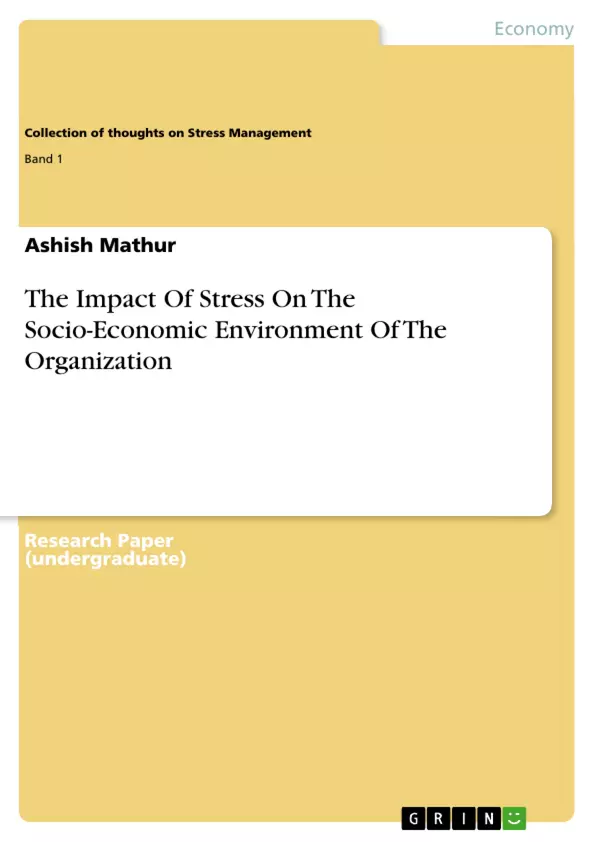Stress is the basic factor impacting the organization and is the major causing of reducing the
productivity of the organizations. Stress is the basis of conflicts and violence in many
organizations. People have problems which need to be resolved otherwise they will put
negative impact touching many dimensions of human life reducing the health and the mental
balance. The organizational productivity will reduce and there will be problems related to the
quality of work life.
One of the greatest challenges facing organizations today is the ever-growing competition,
the continuous increase in customer expectations and customers’ subsequent demands.
Moreover, customers are becoming increasingly critical of the quality of services they
experience. In order to be successful, firms must view stress management as an essential part
of their strategic process.
Increased competition has forced traditional organisations to find ways to retain current
employees and to attract customers the major task of organisations is to promote customer
satisfaction and loyalty while establishing a competitive advantage a major factor on
customer satisfaction and loyalty is the quality. Increased service quality through increased
employee performance is a viable way for organisations to remain competitive. One strategy
which has gained momentum, in services, is the concept of quality and quality management.
Quality can come from happy employees. The stress in the organisations reduces the talents
and competencies by which the employees impact the service quality.
Inhaltsverzeichnis (Table of Contents)
- INTRODUCTION
- LITERATURE REVIEW OF STRESS
- THE IMPACTS OF STRESS ON THE BUSINESS ORGANIZATION
- The social impacts of stress on the business organizations
- Economic Impacts of Business organization
- Environmental Impacts of stress on the organization
- STRESS AND THE ORGANIZATIONS
Zielsetzung und Themenschwerpunkte (Objectives and Key Themes)
This document examines the impact of stress on the socio-economic environment of an organization. The author explores how stress affects employee performance, organizational health, and overall business success.
- The social impacts of stress on the business organization, including its effects on interpersonal relations, employee well-being, and work environment.
- The economic impacts of stress on the business organization, highlighting how it can lead to reduced productivity, decreased earnings, and hinder infrastructure development.
- The environmental impacts of stress on the business organization, focusing on how stress can negatively affect relationships with suppliers and consumers, and ultimately compromise the sustainability of the organization.
- The importance of addressing stress within organizations to promote a positive work culture, employee well-being, and enhance overall organizational performance.
- The role of training and development programs in improving employee competencies and fostering a positive work environment to mitigate the effects of stress.
Zusammenfassung der Kapitel (Chapter Summaries)
The introduction highlights the pervasive nature of stress in organizations and its detrimental effects on productivity, employee well-being, and business performance. It emphasizes the importance of addressing stress as a strategic imperative for organizational success.
The literature review examines existing research on stress management training and its positive impact on employee well-being and organizational outcomes. The author cites several studies that demonstrate the efficacy of stress management interventions in improving employee morale, reducing stress-related symptoms, and enhancing organizational effectiveness.
The chapter on the impacts of stress on the business organization delves into the social, economic, and environmental consequences of stress. It explores how stress can manifest in various forms, leading to interpersonal conflicts, reduced productivity, decreased earnings, and environmental degradation.
The final chapter emphasizes the role of organizations in addressing stress through employee training and development programs. It underscores the importance of promoting a positive work environment, fostering employee well-being, and empowering employees to manage stress effectively.
Schlüsselwörter (Keywords)
Stress, organizational environment, socio-economic impact, employee well-being, productivity, organizational health, training and development, customer satisfaction, competitive advantage, quality management, sustainability, work culture, business organization, business environment.
Frequently Asked Questions
How does stress impact organizational productivity?
Stress is a major cause of reduced productivity, leading to decreased employee performance, conflicts, and a lower quality of work life.
What are the social impacts of stress on a business?
Socially, stress can lead to interpersonal conflicts, violence within the organization, and a decline in the mental and physical health of employees.
How does workplace stress affect customer satisfaction?
Stress reduces employee talents and competencies, which negatively impacts service quality. Since quality is a key driver of customer satisfaction, high stress levels can decrease customer loyalty.
What are the economic consequences of stress for an organization?
Economic impacts include reduced earnings, hindered infrastructure development, and costs associated with low productivity and employee turnover.
How can organizations manage stress effectively?
Organizations should implement stress management as a strategic process, including training and development programs to improve employee competencies and foster a positive work culture.
- Quote paper
- Dr. Ashish Mathur (Author), 2011, The Impact Of Stress On The Socio-Economic Environment Of The Organization, Munich, GRIN Verlag, https://www.grin.com/document/184301



